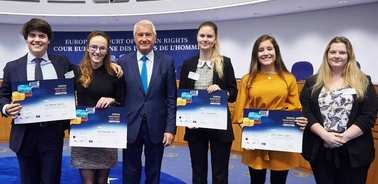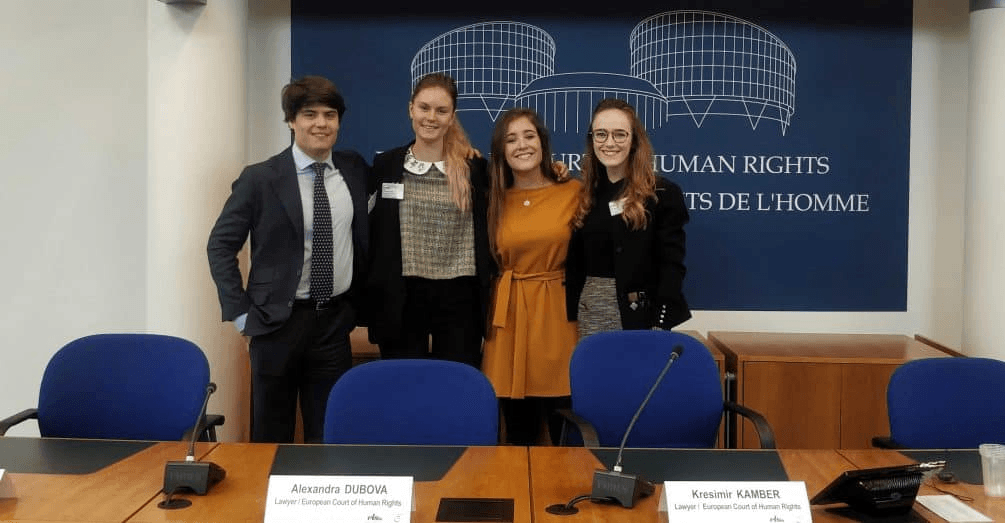- Home
- We Are Law School
- News
- Llb Students Win The European Human Rights Moot Court Competition
LLB students win the European Human Rights Moot Court Competition

Learn what students have to say about their journey at the European Human Rights Moot Court Competition in Strasbourg and why mooting offers a unique opportunity and an invaluable experience.
On Friday 4 May, students from our Bachelor of Laws were declared winners of the sixth edition of the European Moot Court Competition on the European Convention on Human Rights in Strasbourg, France, winning a traineeship at the European Court of Human Rights.
Aida Fernandez, Marie Trapet, Luis Moyano and Marit Thomasdotter, along with the professors Amaya Úbeda and Maria Diaz, are the participants who won the finals against the team from the King’s College (London).
Nineteen universities across 14 countries (including Albania, Bulgaria, Croatia, the Czech Republic, France, Germany, Greece, Romania, Russia, Spain, Sweden, Turkey, Ukraine and the United Kingdom) have competed in a fictive case regarding the right to the freedom of religion. The jury was composed of judges from the Court and senior Council of Europe officials amongst other prominent figures.
A unique learning experience
The Moot Court Competition aims at giving law students, who are future lawyers or judges, practical experience on the European Convention on Human Rights and its implementation.
“Moots offer a unique opportunity that brings together education and practical experience, helping students evolve, for they are competing with universities around Europe to defend Human Rights”, says Amaya Ubeda, IE Law School professor.
“Participating in Moots is great training for public speaking and for developing knowledge and legal skills, which is not easily found in everyday classes. This type of opportunities should be essential in student’s legal training”, highlighted Amaya.
Some of the best student practical learning occurs outside the classroom at the many moot competitions and other extracurricular activities that take place around the world every year and that IE Law School participates in.
In addition to applying the concepts learned in the classroom, these competitive activities aid in the development of rhetorical, teamwork and strategic thinking skills, while providing students valuable and global networking opportunities — not to mention the confidence and self-trust students gain.
“Participating in this competition has given us a great preparation that has allowed us to confront all stages of the competition with confidence and trust. It has been an unforgettable experience and an opportunity of meeting teams from great European law schools, and above all, an opportunity to see that you can do it ok, or even sometimes, better than them,” said Luis Moyano, a fifth-year student of the Dual Degree in Laws & Business Administration.
“As members of the team, we are really lucky to have had the opportunity to participate in this experience and at a young age, pleading a case in the European Court of Human Rights! It has been a profound motivation. Being able to live this experience, in a positive environment with students coming from around Europe, has been a dream come true thanks to the guidance and support of our amazing teachers and IE Law School, that is always promoting these activities”, stated Marie Trapet Llamas, fifth-year student of the Dual Degree in Laws & Business Administration.
The professor’s role
While training and guiding a student’s team, one of the most relevant aspects a teacher must take into account is having a good group of involved, prepared and passionate students.
“Students must have the passion for law and legal arguments. It is not necessary to have lots of knowledge in the beginning, but it is necessary to acquire it as you progress. Students need to invest time and take it seriously”, explained the professor who led the winning team.
Moot Courts consists of two stages: a written and an oral one. “During the oral stage, the competition is in the hands of students, as they are the ones that will have to plead publicly, which requires good preparation, time and team spirit, key elements to making it work”, explained Amaya.
3 Key takeaways!
Always try hard and go that extra mile
“You never know where the opportunities are so you should always try hard; this is something you should apply to everything in life. We all tried to prepare the best way possible with the time we had, and the motivation we got during the first rounds made us go that extra mile that the final required”, said Luis Moyano.
Trust in your team and have a common goal
“Without everyone's work and constant dedication we would have never gotten this far. It is truly important to trust your team and understand that they will all do their part of the job, at their own pace, and work their best, as we all have the same common goal. It´s all about finding a balance between giving enough support to your teammates in whatever they might need, while at the same time giving them enough space to work by themselves”, says Aida.
Be humble and listen to your colleagues
Being humble is in my opinion key. Then, it is undoubtedly also about listening; paying attention and being flexible, as you when being part of a team not only need to coordinate with yourself. Important to keep in mind is that all you do in a team will affect the others as well - both ups and downs”, said Marit, while Luis emphasizes the importance of respecting others work methods.
Read more about the students' experience and their advice here.
